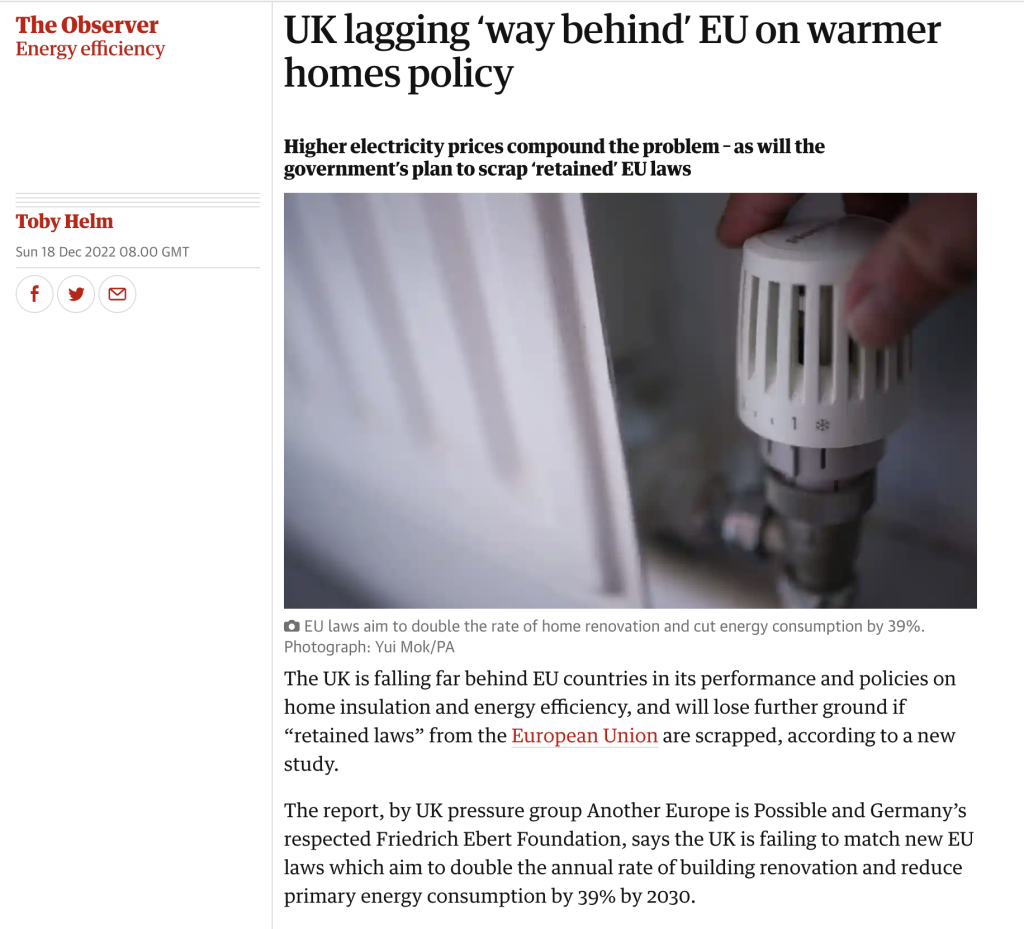We are pleased to present this major new report, Environmental regulation after Brexit; where runs the river? It offers the first comprehensive analysis of how Brexit is transforming environmental laws and agencies.
The report has been published by the Another Europe Is Possible campaign in partnership with the German political party foundation and think tank, Friedrich-Ebert-Stiftung. It paints a negative picture of the state of UK environmental protection – and warns government plans to arbitrarily remove thousands of pieces of EU law from the statute book in a year ‘spells chaos’.
The launch of the report was covered in The Observer on 18th December 2022.

As part of its analysis, the report highlights how tough new EU targets on energy efficiency and home insulation aim to reduce primary energy consumption by some 39% in 2030. This figure reflects the increased ambition of the EU in the face of the Russian war against Ukraine, as the bloc sought to reduce dependency on Russian oil and gas. The UK made no similar adjustments to its energy efficiency and insulation policy after the invasion. Under a revision to the Energy Performance of Buildings Directive, the EU is also standardising energy efficiency measurements and placing new obligations on member-states to retrofit the worst performing buildings in order to meet the 2030 target.
While the UK’s British Energy Security Strategy raises similar points, without the ‘push’ of EU law the rollout of specific schemes to achieve results on the ground has been on a very limited scale. This is especially the case in the domestic sector, where the necessity of action on social grounds is particularly acute. If the UK were still a member of the EU its current policies would not meet the more robust new targets and standards now being set in Brussels.
Report author David Baldock, a Senior Fellow with the Institute for European Environmental Policy, said:
“Our sky-high energy prices mean that we have a clear interest in getting the most out of what we use – but the UK government’s energy efficiency and home insulation agenda continues to lack ambition. This is set to be a key area of UK-EU divergence in the years ahead – as the EU commits its member-states to bold targets on efficiency and insulation.
“Divergence is a two-way street. It can mean getting rid of existing EU rules we’ve inherited from membership. But it can also mean not keeping up with changes the EU is making now. We see both happening in UK-EU environmental regulation. Devolution adds another level of complexity, because in different ways Scotland, Wales and Northern Ireland are all likely to stay closer to the EU status quo.
“Overall, it’s a mixed picture – with elements of divergence going alongside the expensive duplication of existing EU arrangements without much substantive change. But if the Retained EU Law Bill is not substantially amended it could see thousands of EU derived laws taken out of the UK statute book by the end of next year, risking chaos and potentially radical deregulation.”
Nadia Whittome, the Labour MP for Nottingham East, said:
“Fixing the dire state of home insulation is crucial to addressing the cost of living emergency facing millions of people across the UK. At the absolute minimum the government should commit now to matching the EU’s targets for home insulation and energy efficiency by 2030.”
Luke Cooper, Senior Research Fellow at LSE IDEAS and co-founder of the Another Europe Is Possible campaign, said:
“Brexit is increasingly exposed as a failed project – and our environment is paying the price. This report outlines how we can minimise some of the damage Brexit is causing. Protecting the environment requires close cooperation with states in Europe and across the world.”

Featured image on front page: Jim Roberts (Flickr).
19th December 2022
